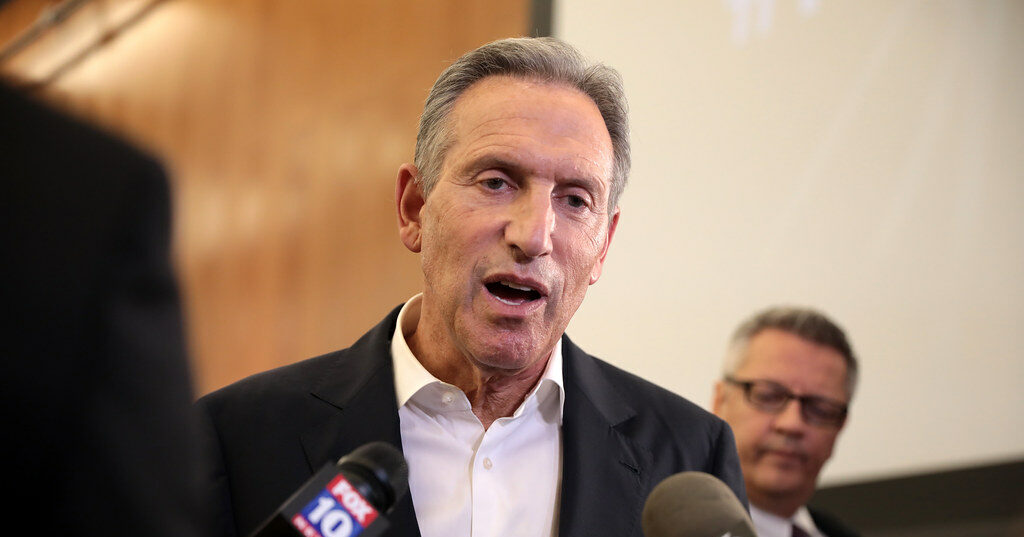by Jordan Zakarin
Starbucks CEO Howard Schultz violated federal law when he promised to provide new benefits only to non-unionizing employees, a labor law expert tells More Perfect Union.
Schultz publicly promised to increase wages and training during the company’s quarterly earnings call on Tuesday. But his pledge came with an exception. “We do not have the same freedom to make these improvements at locations that have a union or where union organizing is underway,” Schultz claimed.
“If they give benefits to unorganized workers and not to organizing ones, then that’s an unfair labor practice,” said Kate Broffenbrenner, the Director of Labor Education Research at Cornell University’s School of Industrial and Labor Relations.
Specifically, by dividing benefits the way Schultz proposed, Starbucks would violate section 8(a)(1) of the National Labor Relations Act.
“They are clearly doing this in a retaliatory manner,” Broffenbrenner added.
New promises of higher wages, improved training, and “coffee excellence” were prompted by the growing unionization drive within Starbucks, which Schultz returned to the company to combat.
“The union contract will not even come close to what Starbucks offers you,” Schultz declared on the earnings call. He claimed that “federal law prohibits” the company from extending new benefits to workers in stores where “Starbucks is required to engage in collective bargaining.”
That is a misrepresentation of the law, Broffenbrenner says.
“Once workers are unionized, they have to bargain over changes. So if Starbucks says they’re offering new benefits, they have to offer them to union workers and give them an opportunity to say whether they want them or not,” Broffenbrenner explains. “They can give it to nobody or give it to everybody.”
In a statement, Starbucks Workers United said that its negotiators “will demand that these modest improvements be given immediately to all the partners.” The union also said it’s filing charges with the National Labor Relations Board “seeking an order that these benefits be given to all employees.”
Schultz has previously warned that unionizing employees could lose out on benefits in multiple internal communications with workers since he returned as CEO one month ago. The company’s website for workers is chock full of anti-union rhetoric and misleading information about potential loss of benefits.
The changes reflect an increasingly aggressive approach to union-busting at Starbucks since the billionaire’s return, with more angry public denigration of unionizing workers and insistence that the company can offer better compensation through benevolence than in a negotiated contract agreement.
The company has adopted the tactic of telling workers to reconsider organizing until they see what emerges from negotiations with Starbucks Workers United over a first contract in two Buffalo stores.
Members of the bargaining committee representing those stores tell More Perfect Union that the company has dragged its feet in negotiations, evidently hoping to extend them as long as possible in order to discourage further unionization. There have been few meetings and little in the way of substantial bargaining, workers say. The lack of progress further delays the negotiating process in the 50 other Starbucks locations that have voted to unionize.
On the earnings call, Schultz claimed that Starbucks is negotiating “in good faith” with employees, a statement undermined by his publicly stated efforts to prevent unionizing workers from getting certain benefits.
Contract delays could also veer into labor law violations, Bronfenbrenner says, but the current rules makes it difficult to stop a company with deep pockets and animosity toward its workers.
“There is no ‘actionable’ under the National Labor Relations Act, except to post a notice,” she says. “Under our current law, you file a charge and the board says ‘go bargain in good faith’ and you file another charge, the board says ‘go bargain in good faith.’ There is no penalty other than ‘bargain in good faith.’”
Workers at more than 50 Starbucks stores have voted to unionize, with more than 200 additional stores awaiting their elections.



